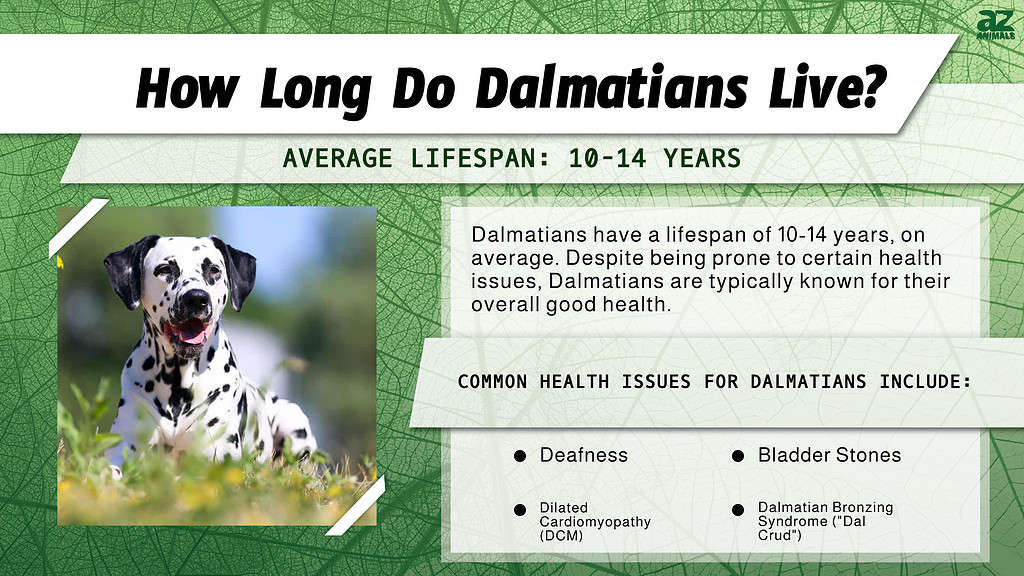
Dalmatians are a beloved and instantly recognizable dog breed. With sleek white bodies covered in bold black spots, these dogs exude charm and elegance. But don’t let their refined appearance fool you; these playful pups have a mischievous streak that can turn any dull moment into a lively adventure! Whether they are stoically relaxing or energetically playing in the yard, Dalmatians can bring a smile to anyone’s face.
As lovable firehouse companions and the adorable stars of Disney’s 101 Dalmatians, Dalmatians have become a highly recognized and sought-after dog breed for many years. So, of course, if you’re considering adopting one of these fun-loving pups, you may wonder, “How long do Dalmatians live?” This article will give you all the necessary information, including the many different aspects that can affect your Dalmatian’s lifespan.
How Long Do Dalmatians Live?
Dalmatians live between 10 and 14 years on average. Although the breed is prone to a few different health issues, Dalmatians are generally pretty healthy dogs. Dalmatians grow around 19 to 24 inches tall at the shoulder, weigh 45 to 70 pounds, and have sleek, muscular bodies built for running. They are an older dog breed, with some of the first records coming from the 1300s in a Croatian region once known as Dalmatia.
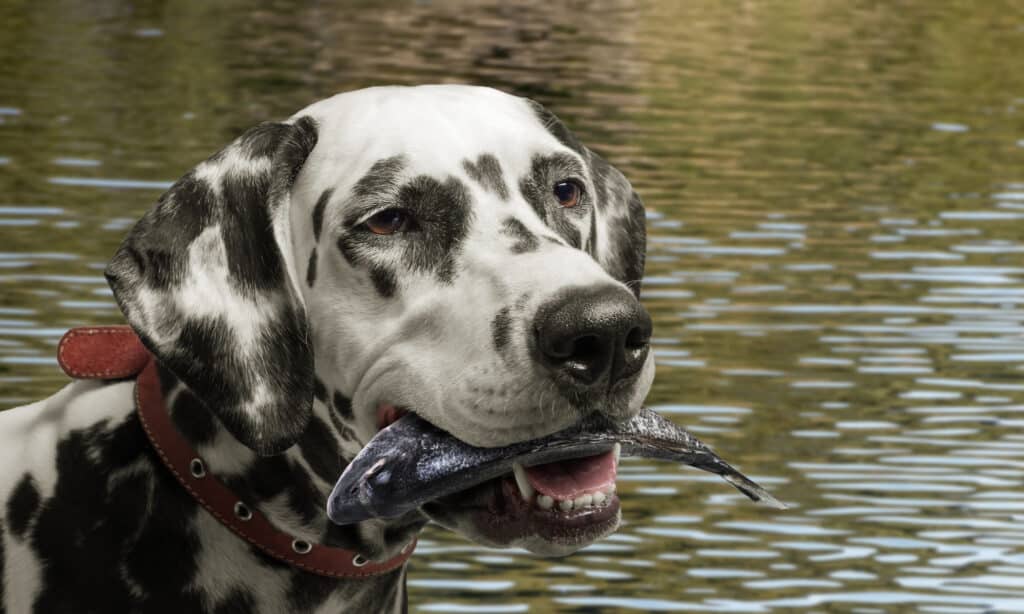
Dalmatians live between 10 and 14 years on average.
©Sergey Fatin/Shutterstock.com
How Old Was the Oldest Dalmatian to Ever Live?
Although Dalmatians typically live between 10 to 14 years on average, it is not unheard of for a Dalmatian to live even longer. In fact, one of the oldest Dalmatians ever recorded died just one month before his twenty-first birthday! The 20-year-old marvel, a Dalmatian named Scootie, was diagnosed with cancer when he was just 10 years old. He also had a serious heart murmur. However, with great genetics, care, and plenty of love, Scooty beat the odds and lived to be 20 years old!
Factors That Impact Dalmatian Lifespan
Dalmatians, like many dog breeds, are susceptible to various health problems. These conditions are typically not life-threatening, but some of them could potentially reduce the dog’s lifespan. In addition, while the Dalmatian is an older, established dog breed, breeding over the past several decades has resulted in many genetic issues.
Disney’s charming 1961 film, 101 Dalmatians, led to a sudden demand for more of these adorably spotty pups. The biggest issue with this, however, is that Dalmatians are not the best dogs for first-time owners, as they require a lot of time, attention, and exercise to keep them happy and healthy. In addition, many unethical puppy mills and backyard breeders saw the rising popularity of Dalmatians as an opportunity to make quick money. Without proper health testing, they began churning out litter after litter. As a result, many Dalmatians are now plagued with inbreeding and genetic health problems, many of which can shorten their lifespan.
Dalmatians today are still very beautiful and lovable dogs, but prospective owners must consider the responsibilities and challenges that may come with owning a Dalmatian. In particular, it’s important to be aware of common health issues and how they might impact your Dalmatian. This will help you to provide the best care possible. So, let’s take a look at some of the most common health issues your Dalmatian may be prone to:
- Deafness
- Bladder Stones
- Dilated Cardiomyopathy (DCM)
- Dalmatian Bronzing Syndrome (“Dal Crud”)
- Skin Allergies
- Copper-Associated Hepatitis
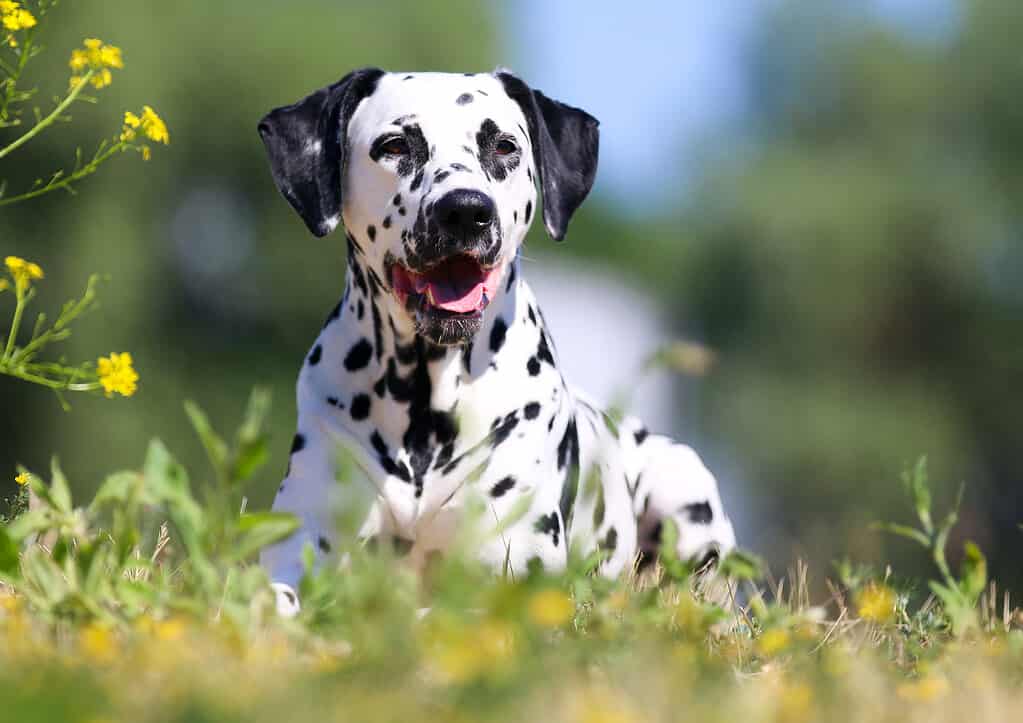
Dalmatians are not the best dogs for first-time owners, as they require a lot of time, attention, and exercise to keep them happy and healthy.
©Lisjatina/Shutterstock.com
Deafness
We’re still not entirely sure why this is the case, but there is a connection between the extreme piebald gene in Dalmatians and the breed’s propensity for deafness. This hearing loss is connected to a special kind of cell called melanocytes. These produce and store pigment and give color to things like the skin and eyes. As a result, between 15% to 30% of Dalmatians are born with deafness in at least one ear. This is especially likely in Dalmatians with blue eyes.
Dalmatians with deafness in only one ear can typically live a pretty normal life, much like those with perfect hearing. However, Dalmatians who are deaf in both ears will require special living conditions and extra training in order to communicate and understand their environment. This is why it is important that breeders get BAER tests (Brainstem Auditory Evoked Response) done on all their dogs and puppies.
Bladder Stones
Many Dalmatians have a condition called hyperuricemia, and their bodies produce too much uric acid. This can lead to things like kidney stones and bladder stones. Dalmatians are also particularly prone to developing urate bladder stones. These are made up of urate crystals and can cause some serious discomfort for your canine companion. This is often linked to a genetic abnormality affecting how their bodies metabolize uric acid. Veterinarians can check for this through DNA testing, x-rays, ultrasounds, and urine sample analyses.
If your Dalmatian gets bladder stones, they can be treated either surgically or non-surgically. Smaller stones can be flushed out of your dog’s bladder using a special catheter technique called urohydropulsion. However, if the stones are too big, surgery may be required in order to remove them.
Dilated Cardiomyopathy (DCM)
Dalmatians also have a higher risk of developing a serious heart condition called dilated cardiomyopathy (DCM). This causes the heart to become abnormally large, thin, and weak, which makes it very difficult to pump blood effectively throughout the dog’s body. As a result, dogs with DCM may start to feel tired or weak. In addition, they may faint, struggle to breathe properly, or experience coughing fits.
Although DCM can lead to congestive heart failure in Dalmatians, vets can detect abnormal heart tissues and abnormal heart rhythms early on. That way, you can treat your dog’s DCM with medication and special dietary supplements to keep them healthy and strong.
Dalmatian Bronzing Syndrome (“Dal Crud”)
This unique condition is an irritation that seems to only affect Dalmatians. Dalmatian bronzing syndrome, also known as “Dal Crud,” affects your dog’s skin and hair. You might notice a striking stripe of bronze or pinkish coloration running from your dog’s head down to their tail. In addition, the dog may also suffer from inflammation, hair loss, and crusty skin in the affected areas.
Unfortunately, the Dalmatian bronzing syndrome is a hereditary condition, and there’s no clear way to prevent it. However, it is manageable, and you can use things like special shampoos and creams, medications and antibiotics, and dietary changes to help make your dog more comfortable. Nevertheless, if you notice any signs or symptoms in your dog’s skin or hair, you must take your dog to the vet right away so that they can help determine the best course of action to keep your puppy happy and healthy.
Skin Allergies
The Dalmatian breed is notorious for its susceptibility to topical and seasonal allergies. Therefore, when it comes to introducing new products or environmental changes to your Dalmatian, you should always keep a close eye out for any signs of redness, bumps, or flaking on their skin. These could be symptoms of an allergic reaction, which is quite common in Dalmatians. Sometimes the treatment is as simple as discontinuing the new shampoo. However, you should consult with your vet to ensure it is not more serious.
Copper-Associated Hepatitis
Copper-associated hepatitis is a type of liver disease that occurs when there’s too much copper in the liver and bloodstream. It usually affects middle-aged to older dogs, but Dalmatians are especially susceptible to it. It’s not entirely clear why Dalmatians are more at risk. However, scientists think it might be due to a genetic problem related to how their bodies process copper.
Copper-associated hepatitis is a pretty serious disease. It can cause your Dalmatian to feel pretty lousy for months or even years before it is diagnosed or treated. In the beginning stages, dogs might just feel a little under the weather, tired, or nauseous. However, as the disease progresses, they can become extremely uncomfortable and experience a lot of pain. This disease causes inflammation, scarring, and destruction of liver cells and tissue. It can lead to serious problems like liver failure if it is not treated properly.
Fortunately, however, there are medical treatments available to manage the early stages of the disease, so if you notice that your pup is feeling off, don’t hesitate to take them to the vet. Treatments focus on removing the excess copper from the dog’s body, stabilizing them, and preventing further absorption into the bloodstream. Some dogs may also need to go on a special low-copper diet to manage this condition.
How to Help Your Dalmatian Live a Long and Healthy Life
It can be overwhelming to learn about all the things that could go wrong and hurt your sweet Dalmatian pup. However, there are also many treatments available today that can help with the conditions we’ve looked at, and there are many positive things you can do to help your dog live a long and healthy life. Let’s take a look at some of the important aspects of caring for your Dalmatian:
- Spaying and Neutering
- Exercise
- Diet
- Environment
- Love
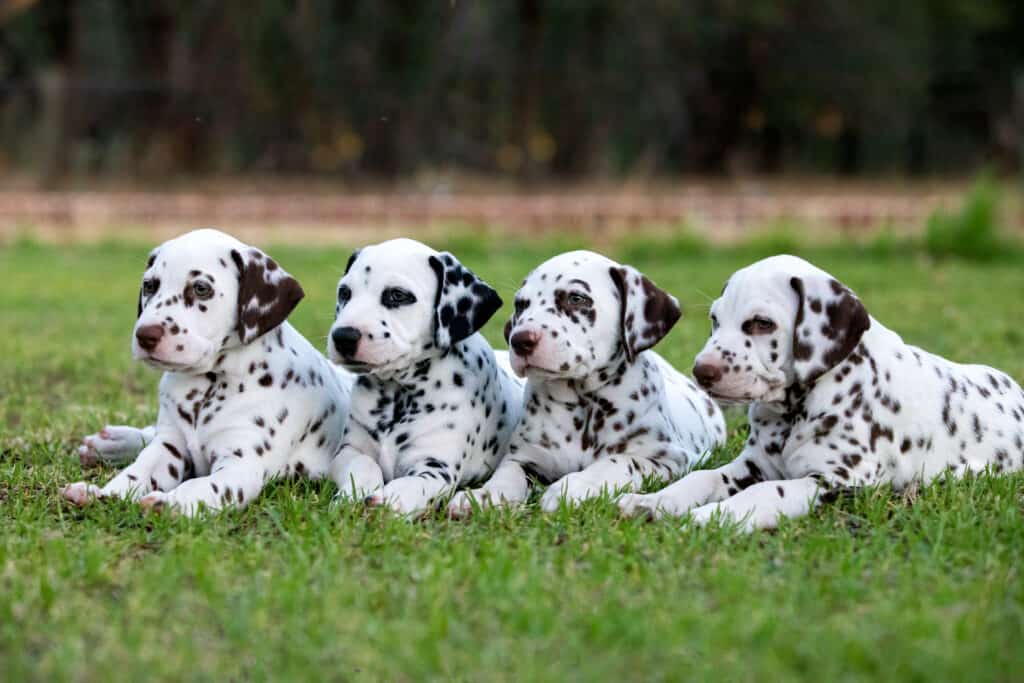
It’s important to socialize your Dalmatian puppies early, so they don’t grow up to be timid.
©iStock.com/animalinfo
Spaying and Neutering
One of the best things you can do to help keep your Dalmatian healthy is to spay or neuter your dog. This helps to reduce the chance of developing certain types of cancers and increases your dog’s longevity. Dogs who have been spayed or neutered typically have fewer health issues than those who have not. For example, spayed female dogs have a much lower chance of developing mammary tumors. Neutering male dogs can help prevent testicular cancer, reduce the risk of prostate disease, and curb unruly and unsafe behaviors like constantly roaming around the neighborhood.
Exercise
Dalmatians are extremely intelligent dogs with spirited natures and lots of energy, so they need an active lifestyle with plenty of exercise. Many Dalmatians love competing in dog sports, but you can also help your dog by playing fetch in the yard, taking them jogging with you, letting them run alongside your bike, take them on a nice long hike.
In addition, Dalmatians are very intelligent, meaning they need plenty of mental stimulation and physical engagement. Things like puzzle toys, dog sports, taking them on walks to new places, swimming, etc., can help provide them with mental stimulation. Dalmatians are very high-energy and crave activity, and if their exercise needs are not met, they can easily cause problems.
However, it is essential to note that if your Dalmatian is under the age of two, you should not exercise them too rigorously. Their joints and bones are not yet strong enough for strenuous activities.
Diet
Dalmatians are not known to be very picky when it comes to mealtime. In addition, they are relatively healthy dogs, so they do not generally require extra supplements or special diets. However, Dalmatians are more likely than some other breeds to suffer from obesity. In addition, they are prone to overeating, so it’s important that you monitor your dog’s food intake and weight regularly, and only offer your dog treats sparingly.
As a medium to large size dog, obesity can cause joint problems and back pain for your Dalmatian. In addition, it can also lead to digestive and metabolic disorders and heart disease.
Since Dalmatians are more prone to developing bladder stones, some dogs may need to be on a low-purine diet. However, before changing your dog’s food be sure to speak with your veterinarian first, as not all dogs will need to be on a low-purine diet.
Environment
As we’ve already seen, Dalmatians are very energetic and active dogs that need plenty of activity, engagement, and exercise. Therefore, these dogs should not be left home alone for long periods of time, as their boredom and pent-up energy can lead to destructive behaviors. In addition, Dalmatians can suffer from separation anxiety, which will aggravate destructive behaviors when they are left alone for too long.
Some people often say that Dalmatians are high-strung, aggressive dogs that are not good for families — however, this is not true. Like any dog, if a Dalmatian is not properly socialized or given the mental and physical stimulation they need, it can get anxious and be prone to causing mischief.
Dalmatians are energetic pups that love nothing more than playing with their favorite humans. They also have very sensitive natures, which means that they form deep bonds with their families and can make fiercely loyal companions. However, if their sensitivity is abused, it can lead to a distrustful Dalmatian. In addition, Dalmatians can be great with kids, but if you have very young children, you should take extra care since these dogs are so energetic and playful.
Love
While keeping your Dalmatian fit and healthy with plenty of exercise is essential, nurturing their emotional well-being is also crucial. Make time each day to pamper your pooch and show them how much you care. Dalmatians can be stubborn, so they do require a firm but loving attitude with plenty of training and a consistent routine. However, it would help if you never punished your Dalmatian harshly. This can cause your dog to shut down, become fearful, or even become aggressive.
Dalmatians are sensitive souls who crave human attention and affection. These dogs need loving companionship and should rarely be left alone. But, if you shower your Dalmatian pup with love, they will be your most loyal life companion.
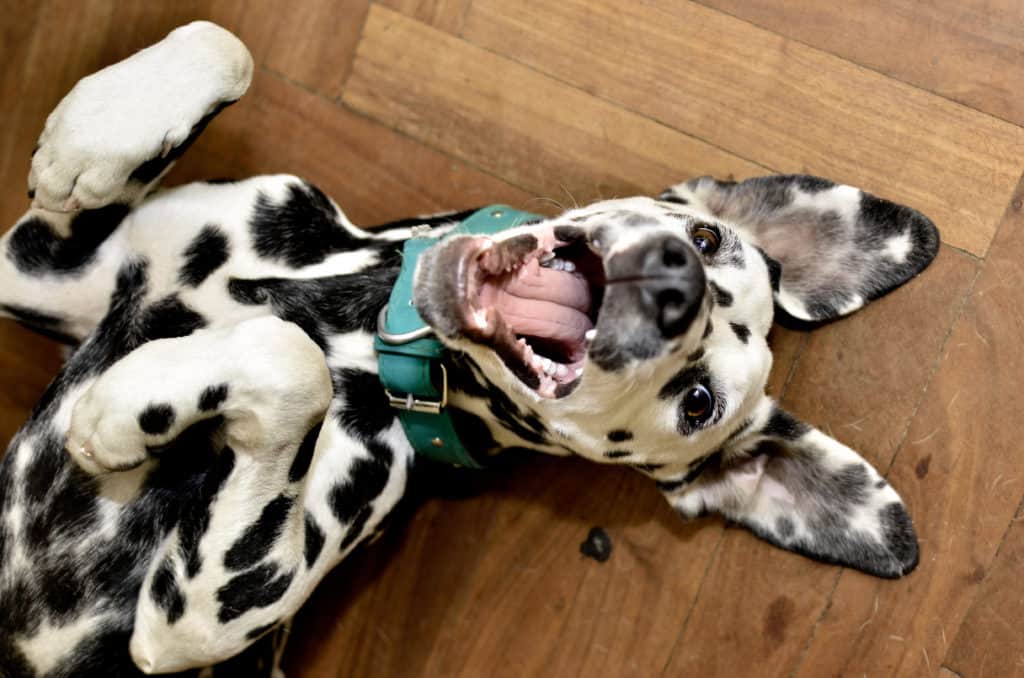
Make time each day to pamper your pooch and show them how much you care.
©patostudio/Shutterstock.com
The photo featured at the top of this post is © Rosa Jay/Shutterstock.com
Ready to discover the top 10 cutest dog breeds in the entire world?
How about the fastest dogs, the largest dogs and those that are -- quite frankly -- just the kindest dogs on the planet? Each day, AZ Animals sends out lists just like this to our thousands of email subscribers. And the best part? It's FREE. Join today by entering your email below.
Thank you for reading! Have some feedback for us? Contact the AZ Animals editorial team.







